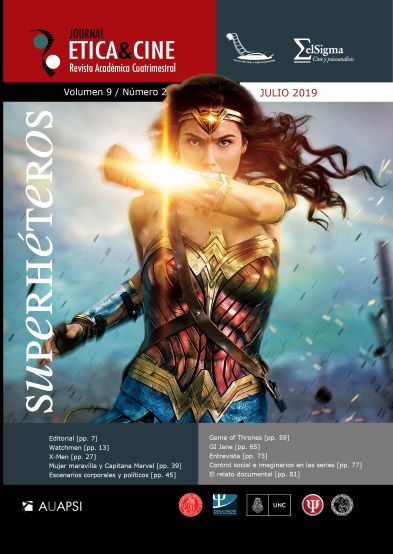The worlds of Watchmen
DOI:
https://doi.org/10.31056/2250.5415.v9.n2.25087Keywords:
Fear, God, Human condition, Joke, Moral dilemma, Punishment, State, UtilityAbstract
This work relates several narratives taken from Watchmen, graphic novel that was adapted in the cinema, with reflection contexts of moral and political philosophy. The work confronts the worlds inhabited by the internal demons that lurk in human beings, and dialogues with some understandings of Kant, Mill, Bentham, Hobbes or Nietzsche. The history of the vigilantes is an opportunity to reflect on the human condition, its dilemmas and its contradictions. Hell is always around the corner, but in the end all is not lost. We will have gained too much if we opt for a greater awareness of our fears and constant ambiguities. To assume our condition and fight for the ideals of truth and justice from a correct understanding is the exercise that is proposed.Downloads
References
Agudelo Ramírez, M. (2015). Cine y Derechos Humanos. Medellín: Unaula.
Bentham, J. (1988) [1789]. The Principles of Morals and Legislation. Buffalo: Prometheus Books.
Dylan, B. (1964). The Times They Are A-Changin. En The Times They Are A-Changin’. [LP, CD, SACD, casete]. Nueva York: Studio A, Columbia Recording Studios.
Held, J. (2009). Can we steer this rudderless world? Kant, Rorschach, Retributivism, and Honor. En M. D. White, Watchmen and philosophy: a Rorschach test, pp. 19-31. Hoboken: Willey.
Hobbes, T. (1994). Leviatán. Barcelona: Altaya.
Kant, I. (1990). Fundamentación de la Metafísica de las Costumbres. Madrid: Alianza Editorial.
Kant, I. (1993). La metafísica de las costumbres. Barcelona: Altaya.
Kukkonen, T. (2009). What’s so goddamned funny’s?. En M. D. White, Watchmen and philosophy: a Rorschach test, pp. 197-213. Hoboken: Willey.
Lloyd, L., Gordon, L., Snyder, D. (productores) y Snyder Z. (director). (2009). Watchmen [Cinta cinematográfica]. EU.: Legendary Pictures, DC Comics, Cruel and Unusual Films y Lawrence Gordon Productions.
Loftis, R. (2009). Means, ends, and the critique of pure superheroes, En M. D. White, Watchmen and philosophy: a Rorschach test, pp. 63-77. Hoboken: Willey.
Marín, R. (2018) [2009]. W de Watchmen. Palma de Mallorca: Dolmen.
Mill, J. S. (1984). El utilitarismo; un sistema de la lógica. Madrid: Alianza Editorial.
Moore A., y Gibbons, D. (1986). Watchmen. New York: DC Comics/Warner Books.
Nuttall, A. (2009). Rorschach: when telling the truth is wrong. En M. D. White, Watchmen and philosophy: a Rorschach test, pp. 91-99. Hoboken: Willey
Skoble, A. (2013). Revisionismo de superheroes en Watchmen y The Dark Kight Returns. En T. Morris & M. Morris (Ed.), Los superhéroes y la filsofía, pp. 59-77. Barcelona: Blackie Books.
Spanokos, T. (2009). Super-vigilantes and the Keene act. En M. D. White, Watchmen and philosophy: a Rorschach test, pp. 33-46. Hoboken; Willey.
Van Ness, S. (2010). Watchmen as Literature, Jefferson: McFarland & Company, Inc.
Ward, A. (2009) Free will and foreknowledge: does Jon really know what Laurie will do next, and can she do otherwise? En M. D. White, Watchmen and philosophy: a Rorschach test, pp. 125-135. Hoboken; Willey.
White, M. (2009). Watchmen and philosophy: a Rorschach test. Hoboken: Willey.
Downloads
Published
How to Cite
Issue
Section
License
Los autores que publiquen en Ética y Cine Journal aceptan las siguientes condiciones:
Los autores/as conservan los derechos de autor © y permiten la publicación a Ética y Cine Journal, bajo licencia CC BY-SA / Reconocimiento - Reconocimiento-CompartirIgual 4.0 Internacional. La adopción de esta licencia permite copiar, redistribuir, comunicar públicamente la obra, reconociendo los créditos de la misma, y construir sobre el material publicado, debiendo otorgar el crédito apropiado a través de un enlace a la licencia e indicando si se realizaron cambios.

Este obra está bajo una licencia de Creative Commons Reconocimiento-CompartirIgual 4.0 Internacional.




